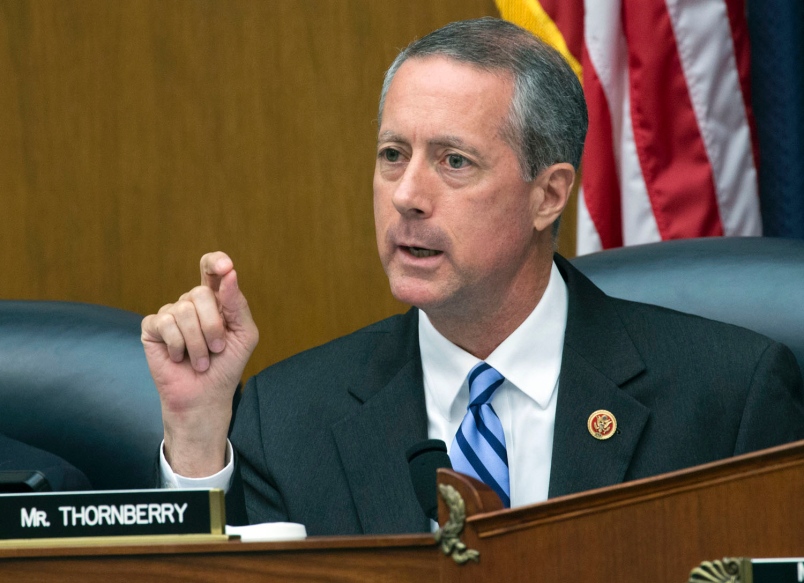"This is an opportunity to hold their feet to the fire and see if North Korea is serious about this," Rep. Thornberry said. “If they’re not serious, then it’s pretty easy to say those joint exercises that were scheduled for August are now going to happen in September or October." CAPITOL HILL: It’s okay for President Trump to “suspend” upcoming military exercises in Korea as a concession to Pyongyang, the House Armed Services chairman said, since other forms of training will continue. Rep. Mac Thornberry was commenting on Trump’s pledge to stop unspecified “wargames” that were both “tremendously expensive” and “very provocative.” Other members of Congress have expressed concern, including prominent Republicans.
It is worth noting that then-President Bill Clinton postponed similar exercises during nuclear negotiations in 1994. This administration briefly paused exercises during an inter-Korean meeting earlier this year. It’s also worth noting that, in recent years, the exercises have included mock “decapitation strikes” intended to practice taking out Kim Jung-un and other North Korean leaders, a practice to which Pyongyang objects.
So are joint military exercises between the US and South Korea a provocation to the North? “Provocation is in the eye of the beholder,” Thornberry told reporters here this afternoon. But do you think they’re provocative?” I do not,” he said, “but, obviously, it is something North Korea has complained about for a long time.” Is it fair to call them “war games”? You can call them training, exercises, or even wargames, Thornberry replied, “I’m for all of those things” — in general.
But whatever you call them, “suspending” them — a term Thornberry used several times instead of more permanent words like “cancel” — is an acceptable concession to make to help keep the North Koreans at the negotiating table, the HASC chairman said: “You’ve got to give these negotiations every opportunity to succeed, so postponing — as long as the negotiations are being productive — these particular joint exercises that were planned for August: OK, well, this is an opportunity to hold their feet to the fire and see if North Korea is serious about this.”
“if they’re not serious, then it’s pretty easy to say those joint exercises that were scheduled for August are now going to happen in September or October,” Thornberry said. (This isn’t necessarily true. Large-scale military exercises often require complicated scheduling to bring all the participants together, especially rare assets like special operators or B-2 stealth bombers, and you can’t turn the logistical arrangements off and then back on again like a switch).
Thornberry doesn’t believe the president has put all Korea-related training on the table. “My understanding is that we have two big joint military exercises with South Korea each year, roughly March (Exercises Foal Eagle and Key Resolve) and August (Exercise Ulchi Freedom Guardian),” he said. “I think what would be suspended, as long as the negotiations are making progress, would be those big joint exercises.”
“Obviously there is a lot more training that goes on consistently throughout the year,” Thornberry said. “I do not think any military can stop training.”
What’s crucial now, Thornberry said, is to keep the pressure on North Korea as Secretary of State Mike Pompeo negotiates a detailed, binding agreement. Pompeo was previously head of the CIA and, before that, a member of Congress. “Having served on the intelligence committee with them,” Thornberry said, “he goes into these negotiations with his eyes wide open… He knows the history, he knows what the regime is like.”
“The task here in my eyes is put ’em to the test,” Thornberry continued. “They need to take specific, concrete, transparent steps towards eliminating their nuclear capability and that’s what matters… A lot of the rest of it may be atmospherics.”
Has President Trump’s dramatic style helped or hindered the American case? “The president’s unconventional rhetoric has been very helpful in getting us to this place,” Thornberry said. “(Personally), I am more a ‘speak softly, carry a big stick’ guy, but I think there’s no doubt — in addition to diplomatic isolation, economic sanctions, our military buildup — in addition to those things, the president’s rhetoric gives North Korea pause.”
“I’m not as concerned about what is said as what is done,” Thornberry said. “If complimenting the guy (Kim) can lead him to give up his nuclear weapons, I think most of us would think the world would be better off.”
In other Singapore Summit fallout news, Pompeo said in Seoul today that the US expects North Korea to effect “major disarmament” within the next two-and-half years. Pompeo’s next stop is China.

No comments:
Post a Comment